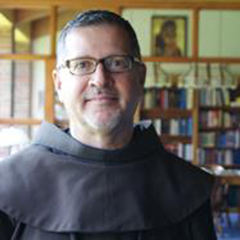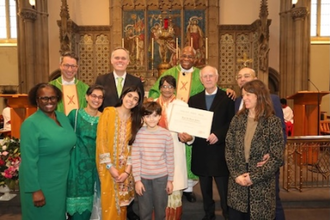Viewpoint: Seeking common ground between Christianity and Islam

Rev Dr Michael D Calabria,
Fr Victor Edwin SJ, director of Vidyajyoti Center for Christian-Muslim Relations at Vidyajyoti College of Theology, New Delhi and editor of Salaam, in conversation with Rev Dr Michael D Calabria, OFM, PhD.
Fr Michael is a Franciscan Friar of Holy Name Province. After studying library science at Columbia University (MLS, 1988) and working as an academic librarian in New York City, he entered the Franciscan Order in 1996 and studied at the Washington Theological Union (M.Div., MA, 2003). As a friar, he lived in Cairo in 2001-02, ministering in a leprosarium; and between 2003-2011 he spent many summers in Egypt teaching English at a Coptic-Catholic seminary in Cairo. Fr Michael began teaching at St Bonaventure University in 2003. After initiating the program in Arabic, he developed and taught a variety of courses in Islamic Studies that comprised a minor in Arabic and Islamic Studies. He wrote his doctoral studies in Islamic Studies with the Institute of Arab and Islamic Studies at the University of Exeter, UK. In April 2015 he successfully defended his dissertation, an analysis of the Egyptians in the Qur'an, Islamic Exegesis and extra-canonical texts. Fr Michael has travelled extensively in the Islamic world, and has visited and conducted research in Morocco, Tunisia, Egypt, Jordan Syria, Oman, Turkey and India. He speaks widely on various aspects of Islam and Islamic culture including the Qur'an, Islamic spirituality, art and architecture, and Christian-Muslim relations.
On his last visit to Delhi, he had long conversations with Victor Edwin SJ, editor of Salaam. Here are excerpts:
Fr Victor Edwin: To some the concept of God in Islam seems to have become overly transcendental. Are there not also many Islamic ways of unfolding its rich inner content since, side by side with normative, orthodox Islam we find Sufi mysticism and popular devotion in India, which you have a firsthand knowledge?
Dr Michael D Calabria: I think that the present over-emphasis on the transcendence of God in Islam - the sense that God is completely "other," over and above everything - is at least in part a reaction against the Christian encroachments from the West that came particularly with colonialism and imperialism. As Christian missionaries aggressively attempted to convert Muslims to believe in God incarnate in Jesus Christ, Muslims needed to define Islam over and against Christianity by (over-) emphasizing the transcendence of God rather than the immanence of God that characterizes Christianity. This is unfortunate because the Qur'an is very balanced in its theology, in its concept of God. It is true that in Islam, God is the All-Powerful, All-Knowing, Creator of the Universe. There is no doubt, according to the Qur'an, that God is in complete control of all the phenomena of nature - the movement of the sun and the stars, the alternation of night and day, all that He is the author of all life. And yet, at the same time, the Qur'an speaks of God as profoundly immanent, close to His creation and His creatures. God says in the Qur'an: "When My servants ask you concerning Me, I am indeed close: I listen to the prayer of every suppliant when they call on Me" (2.186). In one of the most profound passages, God says: "We are nearer to him (humanity) than his jugular vein" (50.16). Now that is as immanent as God can be!
In another passage, we read: "to wherever you turn, there is the face of God" (2.115); that is, God's face is reflected everywhere and in everything He has made. This is a passage that particularly speaks to Sufis who cultivate an awareness of God's presence in all forms of beauty and life. The Sufi sees and senses God palpably immanent in nature in all its forms, in the scent of flowers, in human beings regardless of their gender or faith, and indeed in every place imaginable. There are Sufi poets who see God's eyebrows in the archways of buildings. This is understandable because from the perspective of many Sufis, there is only God - that is, only God has true and eternal existence. Thus, every created thing reflects that one existence, God's existence, albeit temporally. If only God truly is, then concepts of transcendence and immanence become meaningless. God is all and in all. Sufis thus experience God in a more personal, deeply intimate way, as do the mystics of other faith traditions. God is not far, but profoundly present.
I think that particularly in more recent times particularly, Muslim clerics have been concerned about conflating Islamic and Christian concepts of God, and in order to distinguish theologies, they have tended to emphasize God's transcendence over immanence. But clearly, the Qur'an and the Islamic tradition describes a God that is both transcendent and immanent. All sound theological systems must have both concepts of immanence and transcendence otherwise they are ultimately inadequate.
Fr Victor Edwin: Do Christians make the mistake of identifying Islam with Muhammad and the Qur'an, without realizing that the lived faith of Muslims over the centuries and across the continents must also be taken into account when we speak of "Islam"?
Dr Michael D Calabria: I think the problem for both Muslims and non-Muslims alike is identifying Islam only with the early Islamic period - that is, with the lifetime of the Prophet Muhammad and the early Caliphates. Obviously, Muhammad is the Prophet of Islam, the one to whom the Qur'an was revealed. Both the Message and the Messenger are clearly of vital importance for understanding Islam. But after the death of Muhammad, Muslims continued to reflect on the meaning and significance of the Message, and searched for ways to express their faith within their own lives and share it with others. So like other faith traditions, it was Muslims' interaction with the Qur'an and the example of the Prophet that shaped Islam into a Message for peoples of diverse cultures, ethnicities, and languages. It is the centuries following the lifetime of Muhammad that Islam not only spread into different lands but found expression in numerous ways including art, architecture, philosophy, poetry, literature, and the sciences, as well as in Qur'anic commentaries. These expressions also constitute what we call Islam. Historically speaking, Muslims did not define their Islamic faith solely in terms of the Qur'an and hadith. Works of poetry and literature, stories like Laila and Majnun, and Yusuf and Zulaykha spoke powerfully and profoundly to Muslims about their desire for God. Artists and architects searched for ways to reflect God's beauty so that their creations in metal, stone, paper, ceramic, and textiles might serve as reminders to humanity of the Supreme Creator. Through their intellectual endeavors Muslim philosophers and scientists demonstrated what is described in the very first revelation given to Muhammad (96.1-5) - that God is the One who instructs humanity, who teaches humanity what it does not know, and He does this through humanity's exercise of its intellectual abilities.
I think that Shahab Ahmed's book, 'What is Islam?' is especially helpful with this question. He spoke about what he calls the "Balkans-to-Bengal Complex." This refers to the period roughly 1350-1850 in the geographical area that reached from southeastern Europe to South Asia. Ahmed calls this period "post-formative" - i.e. it was a period in which many of the religious debates that characterized the first centuries of Islam had been settled, and there was a general sense of "agreeing to disagree." In other words, this is the period in which Islam really matured into the diversity of schools of thought and forms of practice and expression that we see across much of the Muslim world. I think we tend to view Islam as monolithic whereas the history of Islamic societies, particularly in the 'Balkans-to-Bengal' complex, shows that Muslims in the medieval and early modern period approached their faith in a much more expansive, diverse and creative fashion than in the post-modern world.In our own time, he says, Islam is being forcibly "homogenized" by denying the truth of the historical and cultural diversity in Islamic belief and practice.
Fr Victor Edwin: Muhammad, the Prophet of Islam has been denigrated by some Christians in the past centuries? What should be the Christian approach to Muhammad in the present context and understanding in the light of the teaching of the Vatican II?
Dr Michael D Calabria: The age-old Christian attacks on the Prophet Muhammad (pbuh) sadly continue in some parts of the Christian community. I have never understood why some people of faith people feel they must attack other faiths. If your faith is correct, it can stand on its own merit and truth without attacking another's creed. In the case of a Christian approach to Muhammad, I would say that a Christian should minimally show respect for the Prophet of Islam. After all, he is the Prophet for 1.6 billion Muslims in the world! If Christians speak disrespectfully about Muhammad and thereby alienate and anger Muslims that does not help build the Kingdom of God. This was a keen insight of St. Francis of Assisi. He wrote in his Rule for the friars that would go on mission to Muslim lands that they should not engage in arguments or disputes. In fact, it is very similar to what we find in the Qur'an (al-'Ankabbut 29.46)", "Do not argue with the People of the Book" (i.e. Christians and Jews). Christians must realize that just as we look to Jesus as the model for righteous action, Muslims look to the example of Muhammad. He is moreover the one who received the revelation of the Qur'an from God through the angel Gabriel. For these reasons, if we respect and love our good and faithful Muslim brothers and sisters, we must show respect and honor for the Prophet Muhammad and the Qur'an given to him. The Constitutions of the Franciscan Order tells us that friars should always approach the study of another religion with "great reverence." I think that is what we are all called to do.
Fr Victor Edwin: Muslim theologians seem to hold that human sin is merely a matter of forgetfulness requiring reminder. Christian theologians maintain that human sin is deeply rebellious and requires grace to heal the human wounds of sin. How these two views could be brought into a fruitful theological conversation where both sets of believers benefit mutually?
Dr Michael D Calabria: Actually, I find the concept of sin as described in the Qur'an a rather healthy corrective to some of the theological distortions that crept into Christianity over the centuries. First, according to the Qur'an, humanity is not "tainted" with the sin of Adam and Eve such as articulated in the Christian concept of "original sin." The Qur'an says that Adam and Eve - they are blamed equally for their disobedience to God - "slipped." They "slipped" because they were not paying attention to God and where God was leading them. Yes, it's serious, but not as terrible as rendered in the biblical account where God actually curses humanity. In the Qur'an, immediately following the "slip," God turns to Adam, teaches him, and shows him mercy. Adam is the first prophet of Islam and remains so because he worshipped the one God. For humanity, the children of Adam, we sin because we are forgetful, but that forgetfulness is not trivial or inconsequential. When we forget according to the Qur'an, we forget God and what God has done for us - created us, nurtured and sustained us, taught us, saved us, etc. etc. - and we forget who we are and what we have been created to be. We forget because, rather than giving our attention to God, we listen to the "Whisperer" - Satan or Iblis. The primary purpose of Satan/Iblis is to distract us from God. That's how he caused Adam and Eve to "slip." Satan/Iblis wants to show God that we are ungrateful beings, unworthy of God's love, mercy and munificence. So, yes, the "remedy" for sin in Islam is actually quite simple: turn to God as God continually turns to us; remember God and remember who you are, and you can't go wrong.I think that's rather healthy from a spiritual perspective. It suggests we are in fact much closer to God - and God is much closer to us than we would think. From a Christian perspective, could we not say that Jesus - in his ministry of healing and compassion, and in his self-sacrifice - is a reminder of who God is - and who we are? In fact, all the prophets of Islam, from Adam to Abraham to Moses to John the Baptist, Jesus and Muhammad are simply charged with reminding humanity what it already knows but often that: we are from God, we belong to God, and to God we will return.
Fr Victor Edwin: Is there a valid Islamic critique of some aspect of Christian theology, eg, in the areas of Trinity, redemption , Sonship, intercession etc.? Are we challenged to abandon some antiquated Christian language and to rethink some of our doctrines, without at the same time renouncing the substance which is constitutive of Christian faith and practice?
Dr Michael D Calabria: Briefly, I would say that I often find Islamic critiques of the Trinity valid - not because of the theological concept of the Trinity per se - but because so often when Christians talk about the Trinity, we sound as if we're talking about three gods. Even Christian artwork suggests we have three gods! I want to encourage Christian theologians to articulate the Trinity in a way that is clear and comprehensible while preserving the Oneness of God - Father, Son and Holy Spirit. As far as the term "son" is concerned in reference to Jesus Christ, this has been dealt with by good Muslim theologians, particularly Mahmoud Ayoub. Briefly, I would say that the word "son" is a term of relationship. When Christians say that Jesus Christ is the "son of God," it signifies a closeness of relationship to God (the Father) that is echoed in the Qur'an in many ways while not using the word "son." That the Qur'an speaks of Jesus as conceived in the womb of the Virgin Mary by means of God's creative utterance and by the in-breathing of God's Spirit suggests to me that Christians and Muslims have more to talk about than argue about.
I do not think Christians need to change ways of articulating the faith simply to make it more agreeable to Muslims; but I do think Christians need to better articulate the faith for the diversity of Christians in the 21st century who do not understand the world (or God) in terms of western medieval metaphysics. I think if we "updated" our language and incorporated Asian concepts, we might find that Christianity and Islam have even more in common with one another than previously imagined.


















